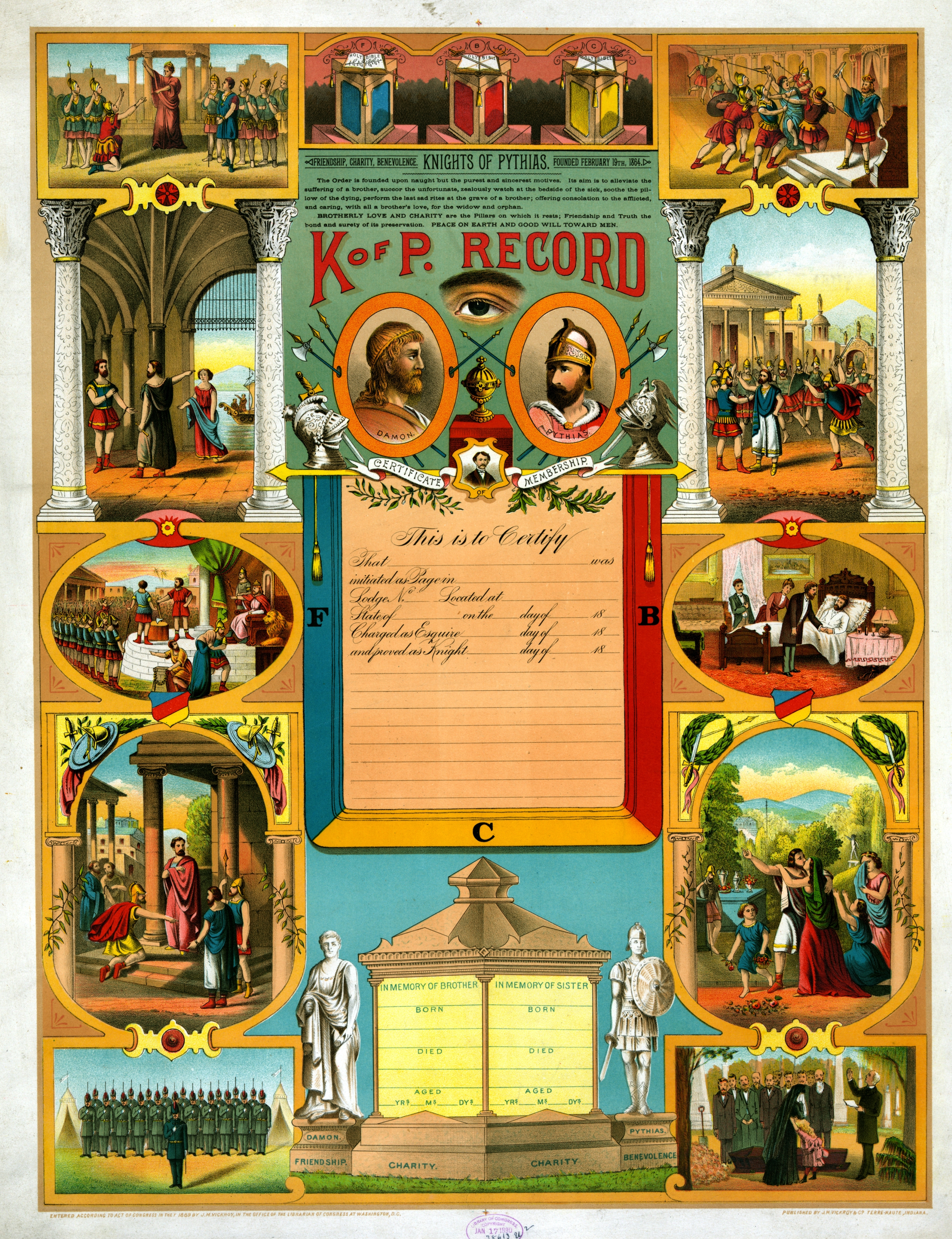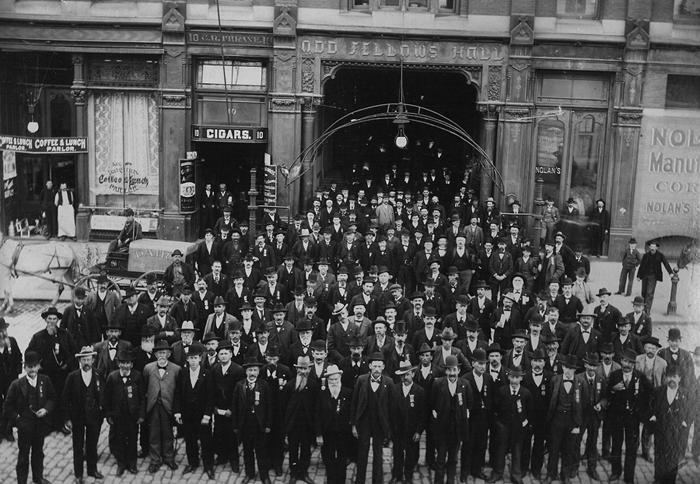|
Charles H. Akers
Charles Henry Akers (September 21, 1857April 14, 1924) was an American politician and businessman. Politically, he began as a Republican and served as Secretary of Arizona Territory as well as a delegate to several national conventions. Akers switch to the Democratic party after leaving office. His later business interests included being publisher of the ''Arizona Gazette''. Biography Akers was born on September 21, 1857, in Millersburg, Iowa, to Dr. John H. and Almerine (Harbaugh) Akers. His father moved the family to Shawnee, Kansas, in 1859 where the younger Akers attended school. At age 15, and "being of a roving disposition", his parents granted him permission to leave home. Akers went to Denver, Colorado, and worked at a brickyard for three months before taking a position herding horses and mules for a business contracting with a railroad. After two-and-a-half years herding, he returned home and attended school for several months. He again left home in early 1875 an ... [...More Info...] [...Related Items...] OR: [Wikipedia] [Google] [Baidu] |
Republican Party (United States)
The Republican Party, also referred to as the GOP ("Grand Old Party"), is one of the two major contemporary political parties in the United States. The GOP was founded in 1854 by anti-slavery activists who opposed the Kansas–Nebraska Act, which allowed for the potential expansion of chattel slavery into the western territories. Since Ronald Reagan's presidency in the 1980s, conservatism has been the dominant ideology of the GOP. It has been the main political rival of the Democratic Party since the mid-1850s. The Republican Party's intellectual predecessor is considered to be Northern members of the Whig Party, with Republican presidents Abraham Lincoln, Rutherford B. Hayes, Chester A. Arthur, and Benjamin Harrison all being Whigs before switching to the party, from which they were elected. The collapse of the Whigs, which had previously been one of the two major parties in the country, strengthened the party's electoral success. Upon its founding, it supported c ... [...More Info...] [...Related Items...] OR: [Wikipedia] [Google] [Baidu] |
Tip Top, Arizona
Tip Top is a ghost town in Yavapai County in the U.S. state of Arizona. The town was settled in 1876 in what was then the Arizona Territory. History Primarily a silver-mining town, it had a post office from August 12, 1880, until February 14, 1895. The town was founded after Jack Moore and Bill Corning struck a significant lode of silver in 1875. The nearby ghost town of Gillett was the original mill site for the ore from the Tip Top mine. Tip Top at its peak had over 500 residents and was one of the largest towns in Arizona at the time. Tip Top's population was 65 in 1890. Many ruins still exist in Tip Top today. Tip Top is the setting for ''The Nightjar Women'', the last story in the weird western Weird West (aka Weird Western) is a term used for the hybrid genres of fantasy Western, horror Western and science fiction Western. The term originated with DC's '' Weird Western Tales'' in 1972, but the idea is older as the genres have bee ... anthology ''Merkabah Rider ... [...More Info...] [...Related Items...] OR: [Wikipedia] [Google] [Baidu] |
Woodmen Of The World
WoodmenLife (officially Woodmen of the World Life Insurance Society) is a not-for-profit fraternal benefit society founded in 1890, based in Omaha, Nebraska, United States, that operates a large privately held insurance company for its members. The history of this organization includes numerous philanthropic efforts and community outreach projects; distinctive headstones depicting tree stumps across the United States and Canada before 1930, a program to present American flags, and broadcast interests that were to own the first television station where Johnny Carson worked. History The organization was founded in 1890 in Omaha, Nebraska, by Joseph Cullen Root. Root founded Modern Woodmen of America (MWA) in Lyons, Iowa, in 1883, after hearing a sermon about "pioneer woodsmen clearing away the forest to provide for their families". Taking his own surname to heart, he wanted to start a society that "would clear away problems of financial security for its members". After interna ... [...More Info...] [...Related Items...] OR: [Wikipedia] [Google] [Baidu] |
Knights Of Pythias
The Knights of Pythias is a fraternal organization and secret society founded in Washington, D.C., on . The Knights of Pythias is the first fraternal organization to receive a charter under an act of the United States Congress. It was founded by Justus H. Rathbone, who had been inspired by a play by the Irish poet John Banim about the legend of Damon and Pythias. This legend illustrates the ideals of loyalty, honor, and friendship that are the center of the order. The order had over 2,000 lodges in the United States and around the world, with a total membership of over 50,000 in 2003. Some lodges meet in structures referred to as Pythian Castles. Organization The structure of the Knights of Pythias is three-tiered. The local units are called "Subordinate Lodges." State and provincial organizations are called "Grand Lodges" and the national structure is called the "Supreme Lodge" and meets in convention biennially. The officers of the Supreme Lodge include the sitting Past ... [...More Info...] [...Related Items...] OR: [Wikipedia] [Google] [Baidu] |
Benevolent And Protective Order Of Elks
The Benevolent and Protective Order of Elks (BPOE; also often known as the Elks Lodge or simply The Elks) is an American fraternal order founded in 1868, originally as a social club in New York City. History The Elks began in 1868 as a social club for minstrel show performers, called the "Jolly Corks". It was established as a private club to elude New York City laws governing the opening hours of public taverns. The Elks borrowed rites and practices from Freemasonry. Membership Belief in a Supreme Being became a prerequisite for membership in 1892. The word "God" was substituted for Supreme Being in 1946. In 1919, a "Flag Day resolution" was passed, barring membership to even passive sympathizers "of the Bolsheviki, Anarchists, the I.W.W., or kindred organizations, or who does not give undivided allegiance to" the flag and constitution of the United States. The BPOE was originally an all-white organization. In the early 1970s, this policy led the Order into conflict wit ... [...More Info...] [...Related Items...] OR: [Wikipedia] [Google] [Baidu] |
Ancient Order Of United Workmen
The Ancient Order of United Workmen (AOUW) was a fraternal organization in the United States and Canada, providing mutual social and financial support after the American Civil War. It was the first of the "fraternal benefit societies", organizations that would offer insurance as well as sickness, accident, death and burial policies. History The order began when John Jordan Upchurch, a mechanic on the Atlantic and Great Western Railroad living in Meadville, Pennsylvania, became dissatisfied with a group he had joined, the League of Friendship, Mechanical Order of the Sun. The latter society had established a lodge, called a subordinate League, in Meadville on April 20, 1868, and its membership was composed almost entirely of mechanics, engineers, firemen and day labors working on the Atlantic and Great Western Railroad and in the local shops. Upchurch joined the local lodge on June 16, its eighth meeting, and soon rose to become its presiding officer. Another person who would ... [...More Info...] [...Related Items...] OR: [Wikipedia] [Google] [Baidu] |
Freemason
Freemasonry or Masonry refers to fraternal organisations that trace their origins to the local guilds of stonemasons that, from the end of the 13th century, regulated the qualifications of stonemasons and their interaction with authorities and clients. Modern Freemasonry broadly consists of two main recognition groups: * Regular Freemasonry insists that a volume of scripture be open in a working lodge, that every member profess belief in a Supreme Being, that no women be admitted, and that the discussion of religion and politics be banned. * Continental Freemasonry consists of the jurisdictions that have removed some, or all, of these restrictions. The basic, local organisational unit of Freemasonry is the Lodge. These private Lodges are usually supervised at the regional level (usually coterminous with a state, province, or national border) by a Grand Lodge or Grand Orient. There is no international, worldwide Grand Lodge that supervises all of Freemasonry; each Grand Lod ... [...More Info...] [...Related Items...] OR: [Wikipedia] [Google] [Baidu] |
Honeymoon
A honeymoon is a vacation taken by newlyweds immediately after their wedding, to celebrate their marriage. Today, honeymoons are often celebrated in destinations considered exotic or romantic. In a similar context, it may also refer to the phase in a couple's relationship - whether they are in matrimony or not - that exists before one becomes a burden to the other. History In Western culture and some westernized countries' cultures, the custom of a newlywed couple's going on a holiday together originated in early-19th-century Great Britain. Upper-class couples would take a "bridal tour", sometimes accompanied by friends or family, to visit relatives who had not been able to attend the wedding. The practice soon spread to the European continent and was known in France as a ''voyage à la façon anglaise'' (translation: English-style voyage), from the 1820s onwards. Honeymoons in the modern sense—a pure holiday voyage undertaken by the couple—became widespread during ... [...More Info...] [...Related Items...] OR: [Wikipedia] [Google] [Baidu] |
Arizona Weekly Journal-Miner
''Arizona Miner'' (alternatively the ''Arizona Weekly Miner'', ''Miner'', or ''Weekly Miner'') was a newspaper published in Prescott, Arizona Territory, from 1868 to 1885 and circulated throughout Yavapai County. The paper merged with the ''Arizona Weekly Journal'' in 1885 to create the ''Arizona Weekly Journal-Miner'', which was published until 1934. It underwent a succession of owners and changes in its publishing frequency as well as its political leanings. History The predecessor paper, the ''Republican Fort Whipple Arizona Miner'', was established in 1864 at Fort Whipple as a monthly. It was owned by then Territorial Secretary Richard C. McCormick who purchased a press in Santa Fe, New Mexico on his initial journey to the territory and transported it in government wagons along with his other personal belongings. The first publisher was Tisdale A. Hand. The first issue was published on March 9, 1864, making it the oldest newspaper in Arizona. The paper was published ... [...More Info...] [...Related Items...] OR: [Wikipedia] [Google] [Baidu] |
1896 Republican National Convention
The 1896 Republican National Convention was held in a temporary structure south of the St. Louis City Hall in Saint Louis, Missouri, from June 16 to June 18, 1896. Former Governor William McKinley of Ohio was nominated for president on the first ballot with 661½ votes to 84½ for House Speaker Thomas Brackett Reed of Maine, 61½ votes for Senator Matthew S. Quay of Pennsylvania, 58 votes for Governor Levi P. Morton of New York who was vice president (1889–1893) under President Benjamin Harrison. New Jersey banker Garret A. Hobart was nominated for vice president over Henry Clay Evans of Tennessee. Joseph B. Foraker of Ohio placed McKinley's name in nomination. The convention was originally slated for the St. Louis Exposition and Music Hall. However it was determined that repairs and upgrading the Hall could not be done in time and so a temporary wood convention hall was built in 60 days at a cost of $60,000 on the lawn south of City Hall which was under construction. At the ... [...More Info...] [...Related Items...] OR: [Wikipedia] [Google] [Baidu] |
Board Of Supervisors
A board of supervisors is a governmental body that oversees the operation of county government in the U.S. states of Arizona, California, Iowa, Mississippi, Virginia, and Wisconsin, as well as 16 counties in New York. There are equivalent agencies in other states. Similar to a city council, a board of supervisors has legislative, executive, and quasi-judicial powers. The important difference is that a county is an administrative division of a state, whereas a city is a municipal corporation; thus, counties implement and, as necessary, refine the local application of state law and public policy, while cities produce and implement their own local laws and public policy (subject to the overriding authority of state law). Often they are concerned with the provision of courts, jails, public health and public lands. Legislative powers Boards may pass and repeal laws, generally called ''ordinances''. Depending on the state, and the subject matter of the law, these laws may apply to ... [...More Info...] [...Related Items...] OR: [Wikipedia] [Google] [Baidu] |
Sheriff
A sheriff is a government official, with varying duties, existing in some countries with historical ties to England where the office originated. There is an analogous, although independently developed, office in Iceland that is commonly translated to English as ''sherif''. Description Historically, a sheriff was a legal official with responsibility for a shire, the term being a contraction of " shire reeve" (Old English ). In British English, the political or legal office of a sheriff, term of office of a sheriff, or jurisdiction of a sheriff, is called a shrievalty in England and Wales, and a sheriffdom in Scotland. In modern times, the specific combination of legal, political and ceremonial duties of a sheriff varies greatly from country to country. * In England, Northern Ireland, or Wales, a sheriff (or high sheriff) is a ceremonial county or city official. * In Scotland, sheriffs are judges. * In the Republic of Ireland, in some counties and in the cities of Dubli ... [...More Info...] [...Related Items...] OR: [Wikipedia] [Google] [Baidu] |





